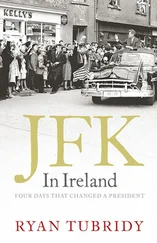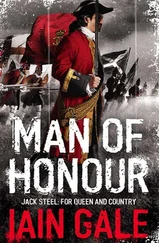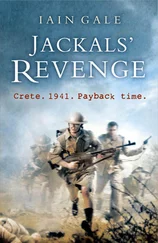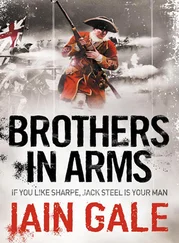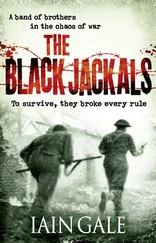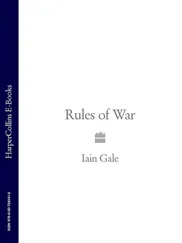Back at their makeshift observatory, they had stood in silence as, revealing nothing, Wellington surveyed the positions. Ziethen had met the hero of Vitoria only once before, last year, in Vienna. He admired his composure. With such coolness he might almost have been a Prussian officer rather than an Englishman. It was this, perhaps, along with the value of his word and his effect on the morale of troops on a battlefield, which he knew Blücher most valued. Gneisenau of course was another matter. Had it been up to him, the Prussians would not now be acting in concord with the English, but would have waited for the promised Austrian army to arrive. But that, they all knew, would have been too late. And so, reluctantly, the Chief of Staff had bowed to the wishes of the Field Marshal. This morning he stood at a little distance from the rest of the party, absorbed, apparently in his own observations.
At one point von Reiche had become excited, spotting on an opposite slope a group of French officers, with among their glittering finery a little man in a drab grey coat. He’d turned to Gneisenau: ‘Bonaparte, your Highness. It’s Bonaparte.’
The Chief of Staff had put a field-glass to his eye. Even Blücher had looked. The Duke alone had continued his inspection in silence, before at length turning to Blü cher. Why, he asked, had he not made use of the reverse slope? Surely the Prussian reserves would take a pounding from the French guns? Ziethen had relished the Field Marshal’s reply: ‘My men like to see their enemy.’
At length, as they were about to descend from the tower, Gneisenau, ever distrustful, had asked the Duke if he would send at least a division as quickly as possible along the Namur road, towards the Prussian lines. Again Wellington had remained silent. And then, pretending to ignore the request, had spent some time with Hardinge, poring over Blü cher’s maps. Nevertheless, before riding off, he had finally offered his assurances that he would come to their aid – providing of course that he was not attacked himself. A conditional promise. Better than none, thought Ziethen. Although within the hour he had cause to doubt his conclusion.
The first great attack had come in three huge, extended columns, each with a cloud of skirmishers in front, which had smashed their way, without waiting for a covering cannonade, through the four-foot high corn towards St Amand and Jagow’s 29th Infantry. The Prussian artillery had done dreadful work among the French, scything into their ranks. And still they came on. Once at the village Jagow’s 2,000 men had poured volley after close-range volley into the front ranks. Yet still they came. It had taken no more than fifteen minutes for the French to drive the beleaguered 29th out of St Amand. This success seemed to be the signal for a wider attack, as the other villages came under a withering fire from, he estimated, at least 100 French cannon. In La Haye, Steinmetz had attempted a counter-attack and moved his brigade reserves against St Amand to bolster the decimated but unbroken 29th.
Where, though, was Wellington? Perhaps, he thought, Gneisenau’s fears were not groundless. About one thing, however, the Duke had been right. The French artillery had been raking the reserve lines for almost an hour. Firing high over the heads of the front line, their ricocheting cannonballs had taken a terrible toll of II Corps. Surely the English would hear that? Surely they must march to the guns? Quietly, Ziethen cursed Gneisenau for his damnable ability to be right.
A roundshot, whistling a little too close over his head, en route for the reserve, brought Ziethen back to the present. Peering ahead, into the valley, he could see, across the entire front, dense columns of French pressing home their attack. Reports were coming in from all sides.
A messenger rode up. One of Jagow’s aides, sent from the bloodbath at Ligny.
‘Herr General, Major-General Jagow begs to inform you that he is facing renewed attacks. He estimates over 10,000 French infantry. He requests reinforcements, sir, but asks me to inform you that he will hold till the last man. He is even now exhorting his men to die for the Fatherland.’
‘Tell him I can promise nothing. I have no more troops in reserve and the whole of II Corps is under heavy fire and unable to manoeuvre. No. Wait. Tell the general. Tell him that something … someone … some men will be with him soon. Tell him to hold on.’
Another rider. This time from Steinmetz. He recognized him. Captain Werner. His face black with gunpowder. A sword cut across his chin.
‘Herr General. Major-General Steinmetz begs to inform you that he has taken more than 2,000 casualties and has been forced out of the village, sir. St Amand is lost. He requests further orders, sir. Shall we counter-attack?’
Ziethen thought for a moment.
‘No, Werner. Tell the general to regroup. To form up before the village. To consolidate whatever remains of his brigade. Tell him that I’m coming. That I’m bringing reserves. Tell him to wait for my arrival. Understand?’
With St Amand gone, their right flank and with it their link with Wellington would be seriously threatened. This had not been part of the master plan. Incredibly, although they must outnumber Napoleon by 10,000 men, they were losing the battle. Ziethen was haunted by memories of Jena. Disgrace. Humiliation. But this was a different army. It was also different, though, from that which had crushed Bonaparte at Leipzig. It was hard to believe how quickly last year the General Staff in their wisdom had disbanded that army. Hard too to credit the short time it had taken to assemble the one now suffering so badly. Young and green, it had been well drilled and disciplined to react like the modern army it must be. But it was still an army constituted for the most part from conscripts and militia. He only hoped that what it lacked in experience it could make up in determination. So far, at least, it seemed to be holding.
Riding around the base of the windmill, Ziethen searched for Blü cher, but found only Gneisenau. Surly. Frowning. A cannonball had cut his horse from under him. He rounded on Ziethen.
‘Well, my dear count. What of this? You will no doubt recall that I advised you that we should not stand here. That we should retire on Liège. Tell me, General von Ziethen, where do you suppose, at this moment, is the Duke of Wellington?’
Ziethen did not rise to the bait, but remained set on the matter in hand.
‘Sir, I must find Marshal Blü cher. We must reinforce the right flank. Both St Amand and La Haye have fallen. We must retake the villages. If we do not we are lost. Our flank will be turned.’
‘Prince Blü cher is down in the valley.’ He gestured towards Ligny. ‘He is doing what he does best. Inspiring men to fight for their country. I am in command.’
‘Then, your Highness, you must decide. Have I your permission to send in a brigade of II Corps?’
‘Count von Ziethen, you are aware that I do not believe that Wellington will come to our aid. But you and I must agree that there is no point in our sacrificing the army. We cannot afford to risk being taken in the flank. Yes, the villages must be retaken. Do what you have to.’
Ziethen called an aide. ‘Send this to II Corps.
‘To Herr General von Tippelskirch, 5th Infantry Brigade. By order of Count von Gneisenau, you will advance to the outskirts of the village of St Amand where you will reinforce General von Steinmetz. You will take the village and hold the position at all costs. Cavalry will be in support.’
As Werner rode off to deliver the order, Ziethen looked again across the valley. Clouds of dense white smoke enveloped the battlefield, along the length of the stream. As ever more wounded emerged dazed and bloody from its depths, so further reinforcements were pressed forward out of sight, to plug the new gaps in the line.
Читать дальше



